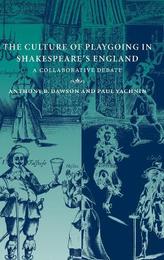
|
The Culture of Playgoing in Shakespeare's England: A Collaborative Debate
Hardback
Main Details
| Title |
The Culture of Playgoing in Shakespeare's England: A Collaborative Debate
|
| Authors and Contributors |
By (author) Anthony B. Dawson
|
|
By (author) Paul Yachnin
|
| Physical Properties |
| Format:Hardback | | Pages:225 | | Dimensions(mm): Height 236,Width 159 |
|
| Category/Genre | Drama |
|---|
| ISBN/Barcode |
9780521800167
|
| Classifications | Dewey:792.094109031 |
|---|
| Audience | | Professional & Vocational | |
|---|
|
Publishing Details |
| Publisher |
Cambridge University Press
|
| Imprint |
Cambridge University Press
|
| Publication Date |
26 March 2001 |
| Publication Country |
United Kingdom
|
Description
How was the experience of watching a play influenced by practices beyond the walls of the playhouse, and what were the broader social and historical implications of the culture of playgoing? The book sets out to answer such questions. Interested first in what happened within the playhouse itself, the authors focus on the person of the actor, on stage props, visual pleasure and audience behaviour. At the same time, their discussion moves outward to consider a range of cultural assumptions and practices - such as eucharistic controversy, prostitution, social mobility, iconoclasm, Renaissance optics, the formation of national memory, and the dissemination of news. Since the two authors have very different perspectives on these issues, they have chosen a unique format: rather than submerging their opposition, they have highlighted it. Their attacks and counter-attacks, as they contest each other's views in paired chapters, result in a lively and illuminating debate.
Author Biography
Anthony B. Dawson is Professor of English at the University of British Columbia. Paul Yachnin is Professor of English at the University of British Columbia.
Reviews'This study of theatre and drama in relation to the culture of Shakespeare's time is intellectually sophisticated, historically informed and engagingly written. Thoroughly up to date in its scholarship and original in its critical approach, it has much to say to students of the period. Its interest lies both in the dialectic of the discrete theoretical approaches of the two authors, and in its practical criticism, sometimes from differing perspectives, of specific plays by both Shakespeare and contemporary dramatists. The most unusual feature of the book ... is the division of authorship from chapter to chapter. This frequently leads to stimulating debate, and especially to a valuable emphasis on the relativity of critical truth, the fact that history looks different when viewed from one perspective rather than another.' Stanley Wells
|